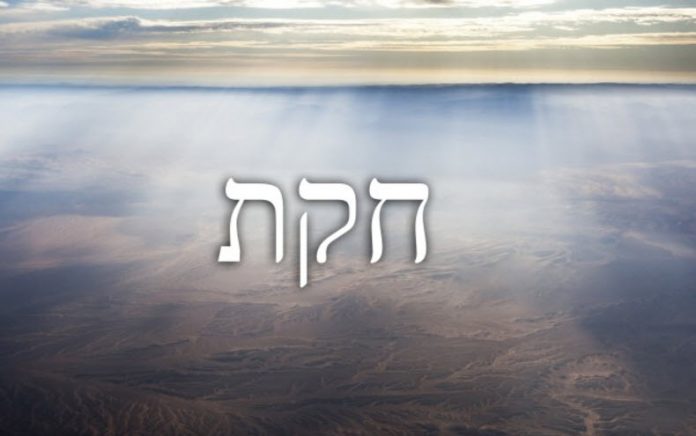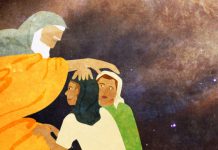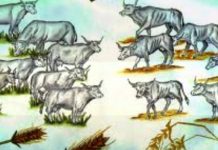Tales of the Red Cow, and Moses Hits the Rock
Jacob rubbed his eyes. Every path he took was a dead end. He was hungry and tired, and now it looked as if he would remain in this maze forever! “If the king wants to amuse himself by setting up such a complex maze of paths, of which only one path reaches the palace, why must I suffer?” thought Jacob to himself as he again reached a dead end and had to about-face.
Suddenly he heard his name being called from high above. “Jacob, Jacob! Look up here!” The sun blinded him as he tried to squint up at the source of the voice. At last, he caught sight of a bearded old sage perched on the roof of the palace, frantically pointing out the path to take.
“Why should I listen to him?” Jacob thought to himself. “Who does he think he is, telling me what to do? It’s a free country and I have can blunder into as many dead ends as I please! (And suffer the consequences, too!)”
Jacob then heard the words of the sage. “I have gone through the king’s maze and found the one path leading to the palace. From my vantage point on the roof, I can view all of the paths in front of you. If you follow my advice, you will be in the palace very shortly and receive a juicy reward. If you reject my advice, you might remain in the maze for the rest of your life!”
This analogy is about how we all try to get through the maze of life, yet very few succeed. So when the wise sages give us advice, we shouldn’t react with, “Mind your own business!” They are just trying to help by imparting their understanding of life.
In Parshat Chukat we read, “The rulers proclaim: Come to Cheshbon!” (Numbers 21:27) – seemingly an invitation to visit their city. However our Sages interpret the verse homiletically: “The rulers of their desires proclaim: Come to the Cheshbon” (accounting) – i.e. let’s make an accounting of the world. Weigh on the scales the pluses and minuses of vice and virtue. Your conclusion will necessarily be that “crime does not pay!” This is the only path that leads out of the maze and into the palace. (Rabbi Moses Chaim Luzzato, Path of the Just)
This week’s Parsha continues to record events during the 40 years the Israelites wandered in the Sinai Desert. Parshat Chukat begins with the laws of the “Red Heifer,” and tells of Moses’ big mistake.
THE RED HEIFER
Contact with death causes spiritual impurity (see Numbers 5:1). One who is spiritually impure was forbidden to enter the Holy Temple or to partake of sacrifices, until undergoing a purification process. The process consisted of selecting an entirely red heifer (a brownish red, a normal color of cows):
- with no more than one black hair,
- that never carried anything for a human, and
- had no physical blemish.
The Red Heifer represented the idea of pure animalism. The heifer was taken out of the sanctuary (there was no place for such raw animalism in God’s Temple), where it was slaughtered and totally burned, together with a branch of cedar wood, hyssop bush, and a piece of red wool dyed with the blood of a worm – symbolizing the highest and lowest species in the plant and animal world. The ashes were mixed with water from a living spring (symbolizing the water-like flow of Torah), and sprinkled on the impure person or vessel on the third and seventh days. At that point, the person became purified.
The paradox was that those who prepared the ashes became impure, until the next day. This begs the question: How can something that purifies-the-impure, at the same time contaminate the pure? Even King Solomon, the wisest of all, said he couldn’t fathom the secret of the Red Heifer. This led him to conclude that all the other 612 Mitzvot – which he thought he did understand – were also above mortal comprehension.
The Sages draw a parallel between the Red Heifer and the Golden Calf. Both were burned and mixed with water, and both spiritually contaminated those who came in contact with them. The analogy is that when a child makes the palace filthy, his mother must clean up. So too, the Red Heifer atones for the Golden Calf.
On a deeper level, the sin of Adam and Eve brought death into the world. Adam’s sin was rectified by the acceptance of the Torah at Sinai, which would have enabled the Jews to live forever. Yet the Golden Calf re-instated mortality. The Red Heifer serves to atone for the Calf and remove the impurity.
Still deeper, the sin of Adam was succumbing to the “Tree of Knowledge” that the Almighty restricted, but that the snake guaranteed would give them all knowledge. The atonement for this haughtiness is an offering whose deep meaning no one can possibly understand – teaching us that this world is much beyond our comprehension.
MOSES’ BIG MISTAKE
The fact that the Torah records the mistake of Moses (as well as many other great biblical figures) is in itself a proof of the Torah’s authenticity. Nobody would write a book that makes himself look bad!
Judaism teaches that our forefathers were not “saints with halos,” but mortals who made mistakes. On the other hand, the mistakes of these great people requires much study to understand exactly what they did wrong, so we can derive the proper lesson.
When Miriam died, the well of water that accompanied the Jewish people, dried up. The Talmud records: The water was in the merit of Miriam, the manna was in the merit of Moses, and the Clouds of Glory were in the merit of Aaron. Therefore, when the water stopped at the death of Miriam, it later returned in the merit of Moses and Aaron. When Aaron died, the Clouds left and returned in the merit of Moses. And when Moses died, all three miracles ceased.
When the Jews complained about the drought (a justified complaint!), God told Moses to take his staff, gather the entire nation around the rock (a miraculous accomplishment in and of itself!), and speak to the rock, which would then give forth water.
Moses selected the wrong rock to speak to (it seems the rock moved around) and the result was that nothing happened. The people complained, and Moses became angry.
Moses then consulted with Aaron. They decided that “maybe we should hit the rock like the first time” and proceeded to hit the correct rock. But it only yielded a few drops. Moses hit it a second time and finally the H2O gushed forth.
At this point, God was angry with Moses and Aaron, who did not “believe in Me to sanctify Me before the people” (Numbers 20:12). Their punishment was that they themselves would not enter the Land of Israel.
The commentaries site various opinions of what was Moses’ actual mistake:
- He hit the rock instead of speaking to it.
- He hit it twice.
- He got angry.
- He belittled the people.
Question: Why was Moses told to take his staff, if he was only supposed to speak to the rock?
Answer: God wanted to demonstrate that once the Jews entered the Land of Israel, the period of open miracles would end. So God commanded Moses to take the staff – but don’t use it! From now on, it is the word of Moses as set forth in the Torah, that we must rely on instead. (Rabbi S.R. Hirsch)
If a rock – that has no free will, and no motivation of reward or punishment – “listens” to the word of Moses, then certainly we should! Yet when Moses hit the rock, this effect was lost. (Rashi)
Question: Why did God command Moses to hit the rock in Exodus 17:6, while here he was told only to speak to it?
Answer: Hitting the rock with the staff symbolized a new miracle, just as the Ten Plagues in Egypt which were also performed with the staff. In the Book of Exodus, God told Moses to hit the rock to initially create this well. Now, however, at the end of 40 years, it was not necessary to hit the rock. The water had only stopped temporarily in order to demonstrate the merit of Miriam. In other words, “We know you need water, it’s right here, let me just talk to the rock.” When Moses hit the rock, it looked as if, “Oh, we forgot you need water. Since you complained, I will now make a new miracle and hit the rock to provide water.” This was Moses’ subtle mistake.(Rabbi S.R. Hirsch)
Since the message that “from now on we must follow the word of Moses” was not learned the easy way, it must now be learned the hard way. Moses and Aaron would not enter the land, and the people would realize that the “staff of Moses” is gone – and in its place is the legacy of “the word of Moses.”
LOGBOOK OF THE DESERT JOURNEY
(1) Emissary to Edom – Moses sent a message to Edom (the descendents of Esav): “So says your brother Israel: You are aware of our history. We were slaves in Egypt, and the Egyptians dealt very badly with us. We cried to the Almighty and He saved us. Now let us take a shortcut through your land” (Numbers 20:17).
The reason for the historical introduction was because the decree of slavery was on all the descendents of Isaac – including Esav. The Jews were in effect saying: “We paid off your debt, too. The least you can do is let us pass through your land.”
Although it didn’t interest Esav, the Jews mentioned the power of prayer that was the blessing they received from Isaac: “The voice is that of Jacob” (Genesis 27:22). Edom, however, refused them permission, by citing their own blessing from Isaac: “By your sword shall you live” (Genesis 27:40). Edom emphasized: “Don’t enter my land or I will come to meet you with the sword!” (Numbers 20:18)
(2) Death of Aaron – Moses broke the news gently to Aaron, as he led him up the mountain of Hor (one peak above another). Aaron accepted God’s decree with love. Aaron’s holy garments were transmitted to his son Elazar (something that Moses, whose sons had no distinction, did not merit). They entered a chamber, which contained a bed, and a table with a burning candle. Moses instructed Aaron to lie on the bed, spread out his limbs, and close his mouth and eyes. Aaron then expired as one falls asleep. This was called the “kiss of death,” and Moses requested to die in the same manner. (Midrash quoted in Rashi)
(3) Amalek Attacks – When the Jews first were about to enter Israel after leaving Egypt, they were attacked by their archenemy Amalek (see Exodus 17:8). Now, 40 years later, at the entrance of Israel again – Amalek attacks again. However, being aware of the power of Jewish prayer, the Amalekites changed their language to a Canaanite dialect in order to fool the Jews into praying for salvation from the Canaanites. That’s why the verse refers to them as Canaanites (Numbers 21:1). The Jews, perplexed by the Amalekite dress and Canaanite speech, asked the Almighty to save them from “this nation” (Numbers 21:2) – i.e. whomever they might be. And their prayer was answered.
Question: Why didn’t the Amalekites change their dress as well, to really fool the Jews?
Answer: If you dress and talk like a Canaanite, you become a Canaanite! So the Jews’ prayers would certainly have been answered.
(4) The Copper Serpent – When the Jews again complained about the manna, God decided to let them taste normal life in a desert without Divine intervention. They were attacked by snakes and serpents that killed many Jews.
The Sages point out that snakes have no taste buds and all food tastes the same to them. When the snake is asked why he bites without getting any pleasure, he merely replies, “And what physical pleasure does the slanderer receive?” The measure-for-measure punishment for complaining about the manna – which tasted as anything you like, was to be bitten by a snake – to whom all food tasted the same.
Moses set up a copper serpent. The victims of the snakebite could see the serpent, raise up their eyes to Heaven, and hope to survive and prosper. The Talmud records that hundreds of years later, the Jewish king Chizkiyahu destroyed the copper serpent, because the people were idolizing it and losing their faith in God (see Kings II 18:4).
(5) Ambush in the Jagged Cliffs – As the Jews approached the land of Canaan, the Emorites plotted to ambush them. The travel route winded into a valley between two jagged cliffs with caves inside. The Emorites hid in the caves and waited for the Jews to pass underneath, in order to pounce on them.
God saved the Jews miraculously by pushing the two cliffs together, crushing everyone inside the caves. The Israelites, who had detoured around the cliffs, were not even aware of the danger they’d been in. In order to inform them, the well of Miriam took a detour and passed between the cliffs, washing away blood, limbs and weapons. When the people realized the extent of the miracle, they sang praises. (Midrash quoted in Rashi)
(6) The Song of the Well – “Then did Israel sing this song, Arise, oh well!” (Numbers 21:17) In contrast to the song at the Red Sea (see Exodus 15:1), no mention is made of Moses or God. We understand that Moses had negative associations with the well that had caused him to die in the desert, but why is God’s name not mentioned?
The analogy given is of the king who was invited to a party. The king inquired if his best friend would be there. “If my friend isn’t coming, then neither am I!” Since Moses was not mentioned, God’s name is absent as well.
Question: Why didn’t the Jews sing for receiving the Torah as they did for the well and the splitting of the Red Sea?
Answer: The well of living waters is symbolic of “Torah,” a constant source of spirituality to the world. The song of the well is basically a song for Torah, which is also referred to as “a song” (see Deut. 25:19). (Heard from Rabbi Asher Weiss)
(7) The Giant Guards – Sichon and Og were two giant kings who controlled the eastern bank of the Jordan River. When Moses asked their permission for free passage, both giants laughed at him. “We collect taxes to protect the country from the enemy (i.e. yourselves) – and now you expect us to give you free passage?!”
The end of the Parsha mentions that the land the Israelites took from Sichon originally belonged to Moab. The Jews were technically forbidden to attack Moab (a descendent of Lot), but since this land was conquered by Sichon in battle (with the help of the curse of the prophet Bilaam, see Parshat Balak), it now became permitted for the Israelites to acquire. In the battle, Moses eliminated both Sichon and Og.
credit aish.com
Shabbat Shalom!














